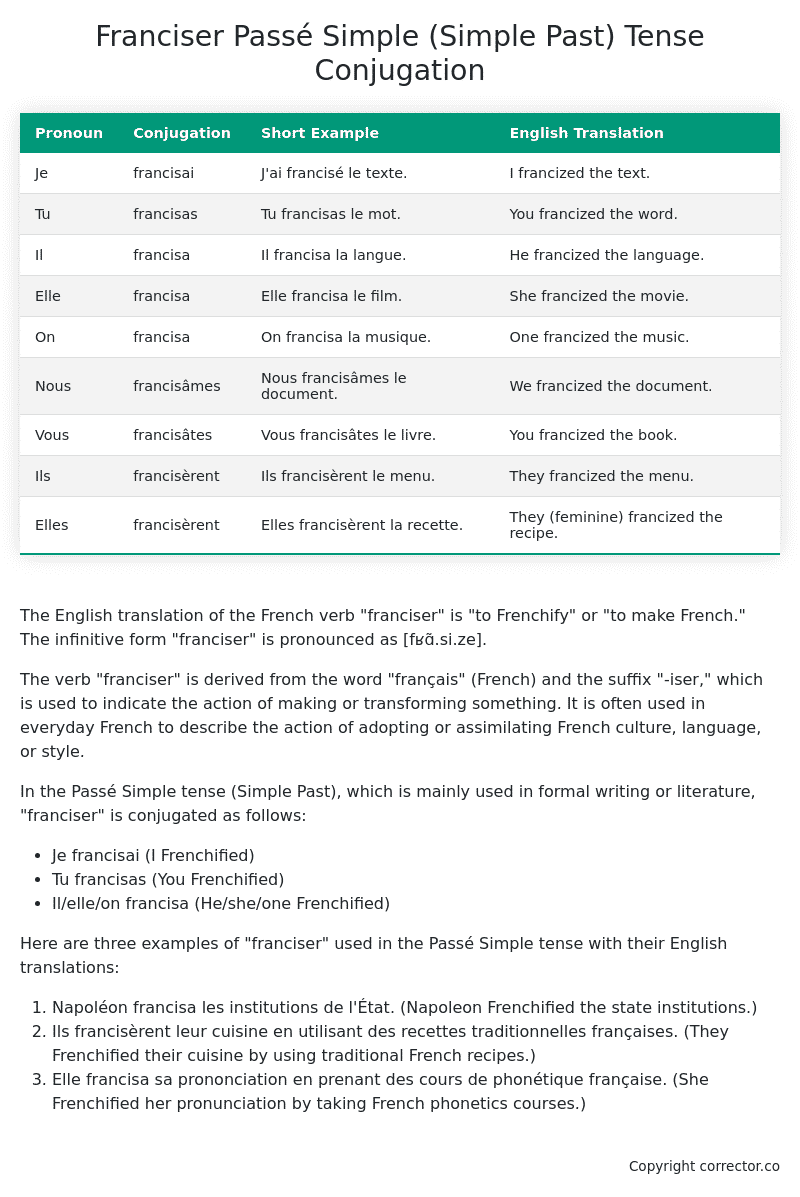Passé Simple (Simple Past) Tense Conjugation of the French Verb franciser
Introduction to the verb franciser
The English translation of the French verb “franciser” is “to Frenchify” or “to make French.” The infinitive form “franciser” is pronounced as [fʁɑ̃.si.ze].
The verb “franciser” is derived from the word “français” (French) and the suffix “-iser,” which is used to indicate the action of making or transforming something. It is often used in everyday French to describe the action of adopting or assimilating French culture, language, or style.
In the Passé Simple tense (Simple Past), which is mainly used in formal writing or literature, “franciser” is conjugated as follows:
- Je francisai (I Frenchified)
- Tu francisas (You Frenchified)
- Il/elle/on francisa (He/she/one Frenchified)
Here are three examples of “franciser” used in the Passé Simple tense with their English translations:
- Napoléon francisa les institutions de l’État. (Napoleon Frenchified the state institutions.)
- Ils francisèrent leur cuisine en utilisant des recettes traditionnelles françaises. (They Frenchified their cuisine by using traditional French recipes.)
- Elle francisa sa prononciation en prenant des cours de phonétique française. (She Frenchified her pronunciation by taking French phonetics courses.)
Table of the Passé Simple (Simple Past) Tense Conjugation of franciser
| Pronoun | Conjugation | Short Example | English Translation |
|---|---|---|---|
| Je | francisai | J’ai francisé le texte. | I francized the text. |
| Tu | francisas | Tu francisas le mot. | You francized the word. |
| Il | francisa | Il francisa la langue. | He francized the language. |
| Elle | francisa | Elle francisa le film. | She francized the movie. |
| On | francisa | On francisa la musique. | One francized the music. |
| Nous | francisâmes | Nous francisâmes le document. | We francized the document. |
| Vous | francisâtes | Vous francisâtes le livre. | You francized the book. |
| Ils | francisèrent | Ils francisèrent le menu. | They francized the menu. |
| Elles | francisèrent | Elles francisèrent la recette. | They (feminine) francized the recipe. |
Other Conjugations for Franciser.
Le Present (Present Tense) Conjugation of the French Verb franciser
Imparfait (Imperfect) Tense Conjugation of the French Verb franciser
Passé Simple (Simple Past) Tense Conjugation of the French Verb franciser (You’re reading it right now!)
Passé Composé (Present Perfect) Tense Conjugation of the French Verb franciser
Futur Simple (Simple Future) Tense Conjugation of the French Verb franciser
Futur Proche (Near Future) Tense Conjugation of the French Verb franciser
Plus-que-parfait (Pluperfect) Tense Conjugation of the French Verb franciser
Passé Antérieur (Past Anterior) Tense Conjugation of the French Verb franciser
Futur Antérieur (Future Anterior) Tense Conjugation of the French Verb franciser
Subjonctif Présent (Subjunctive Present) Tense Conjugation of the French Verb franciser
Subjonctif Passé (Subjunctive Past) Tense Conjugation of the French Verb franciser
Subjonctif Imparfait (Subjunctive Imperfect) Tense Conjugation of the French Verb franciser
Subjonctif Plus-que-parfait (Subjunctive Pluperfect) Tense Conjugation of the French Verb franciser
Conditionnel Présent (Conditional Present) Tense Conjugation of the French Verb franciser
Conditionnel Passé (Conditional Past) Tense Conjugation of the French Verb franciser
Conditionnel Passé II (Conditional Past II) Tense Conjugation of the French Verb franciser
L’impératif Présent (Imperative Present) Tense Conjugation of the French Verb franciser
L’impératif Passé (Imperative Past) Tense Conjugation of the French Verb franciser
L’infinitif Présent (Infinitive Present) Tense Conjugation of the French Verb franciser
L’infinitif Passé (Infinitive Past) Tense Conjugation of the French Verb franciser
Le Participe Présent (Present Participle) Tense Conjugation of the French Verb franciser
Le Participe Passé (Past Participle) Tense Conjugation of the French Verb franciser
Struggling with French verbs or the language in general? Why not use our free French Grammar Checker – no registration required!
Get a FREE Download Study Sheet of this Conjugation 🔥
Simply right click the image below, click “save image” and get your free reference for the franciser Passé Simple tense conjugation!

Franciser – About the French Passé Simple (Simple Past) Tense
Formation
Usage
Narration
Historical Context
Interactions with other tenses
Passé Composé
Imparfait
Conditional and Subjunctive
Summary
I hope you enjoyed this article on the verb franciser. Still in a learning mood? Check out another TOTALLY random French verb conjugation!


